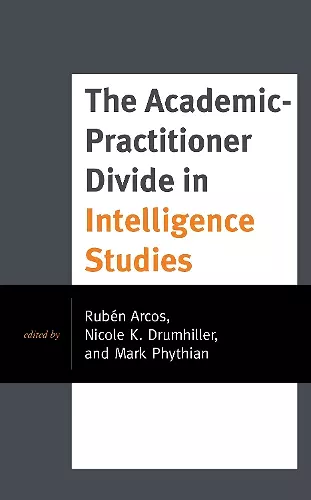The Academic-Practitioner Divide in Intelligence Studies
Mark Phythian editor Rubén Arcos editor Nicole K Drumhiller editor
Format:Paperback
Publisher:Rowman & Littlefield
Published:15th Mar '24
Should be back in stock very soon

Internationally, the profession of intelligence continues to develop and expand. So too does the academic field of intelligence, both in terms of intelligence as a focus for academic research and in terms of the delivery of university courses in intelligence and related areas. To a significant extent both the profession of intelligence and those delivering intelligence education share a common aim of developing intelligence as a discipline. However, this shared interest must also navigate the existence of an academic-practitioner divide. Such a divide is far from unique to intelligence – it exists in various forms across most professions – but it is distinctive in the field of intelligence because of the centrality of secrecy to the profession of intelligence and the way in which this constitutes a barrier to understanding and openly teaching about aspects of intelligence. How can co-operation in developing the profession and academic study be maximized when faced with this divide? How can and should this divide be navigated? The Academic-Practitioner Divide in Intelligence provides a range of international approaches to, and perspectives on, these crucial questions.
This finely crafted volume explores ongoing efforts to bridge the gap between intelligence professionals and academics. Reflecting the contributors’ diverse careers and national perspectives, these essays offer novel ways to improve intelligence research, teaching, and practice. The volume identifies new opportunities for collaboration, while showcasing some of today’s most innovative thinkers in the field of intelligence studies.
-- James J. Wirtz, U.S. Naval Postgraduate SchoolThe Academic-Practitioner Divide in Intelligence Studies, which displays a rich assortment of global academic and practitioner perspectives, confers the most comprehensive examination of the complexity surrounding the paradoxical—divergent while also symbiotic—relationship between professionals and scholars of intelligence, in their quest to develop intelligence as an academic discipline.
-- Florina Cristiana Matei, Naval Postgraduate SchoolThe editors and authors have produced a unique and timely contribution. As the security environment becomes increasingly complex, bridging the academic-practitioner divide is becoming more necessary. This excellent volume skillfully identifies where the red lines and challenges are yet usefully shows how both academics and practitioners can work closer together to progress teaching and research excellence in the intelligence field.
-- Patrick F. Walsh, Charles Sturt University, Editor, Australian Institute of Professional Intelligence Officers Journal, author of Intelligence and Intelligence AnalysisThose who know don’t speak; those who speak don’t know.’ Practitioners’ traditional view of academic researchers is challenged by this diverse collection on comparative developments in Intelligence Studies. It shows how productive relationships can be enhanced while acknowledging correctly that the gap neither can nor should be eliminated entirely.
-- Peter Gill, International Studies Association Distinguished SchISBN: 9781538196175
Dimensions: 227mm x 151mm x 24mm
Weight: 503g
330 pages